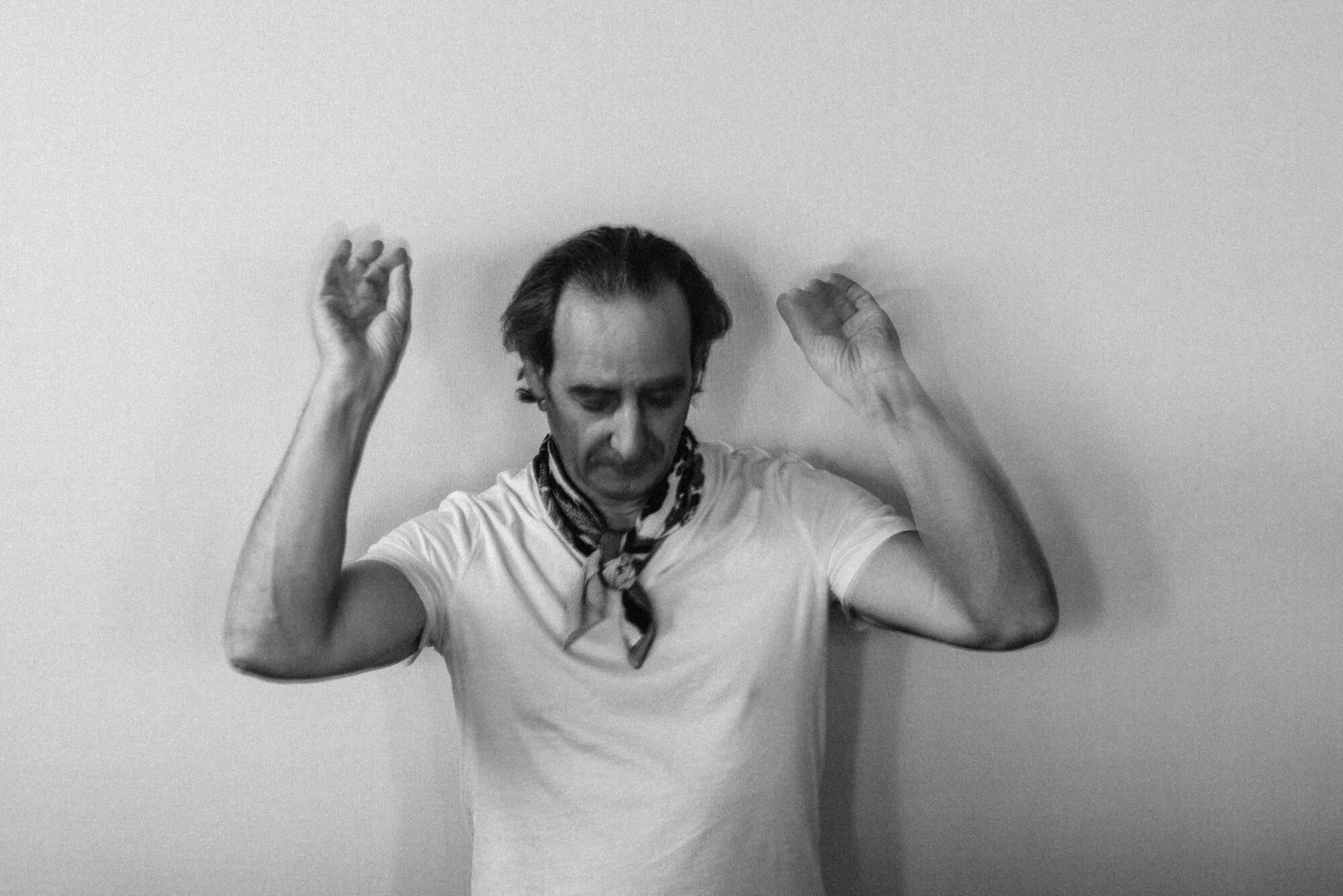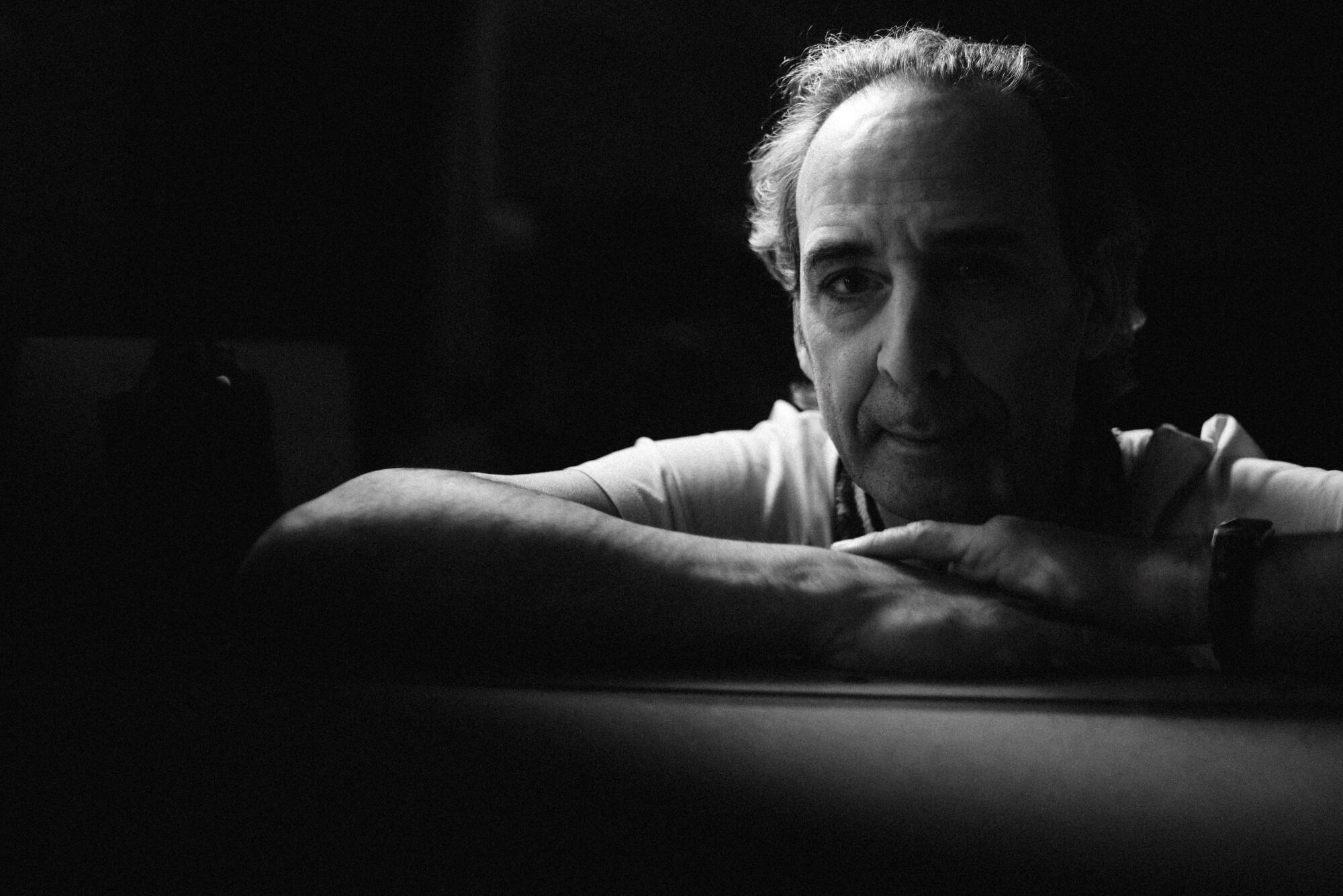An infinite shadow hovers over the characters in “Jurassic World: Rebirth,” and it’s the identical one which has been dogging composer Alexandre Desplat ever since he was a youngster in Paris.
That shadow? The music of John Williams.
“He’s such a legend for all of us,” says Desplat, 63, on a Zoom name from London, the place he’s been burning the midnight oil on the rating for Guillermo del Toro’s upcoming “Frankenstein.” “He’s simply the one one to observe.”
Like Williams, Desplat is now a grizzled (although painterly good-looking) veteran himself, with lots of of movies to his identify. He’s already accomplished three scores this yr alone — for the French-Swedish Palme d’Or nominee “Eagles of the Republic,” Wes Anderson’s “The Phoenician Scheme” and this week’s “Jurassic” heavyweight.
He’s additionally making his North American conducting debut on July 15 in a grand survey of his movie profession on the Hollywood Bowl, a becoming, if overdue, coronation of his two-decade reign as an A-list composer in America.
When Desplat started scoring Hollywood movies within the early 2000s, his music swept in like a breath of contemporary French air — elegant, restrained, melodic, idiosyncratic — and the checklist of filmmakers who sought him out reads like a large part of the Criterion Closet: Terrence Malick, Ang Lee, Kathryn Bigelow, David Fincher, Jonathan Glazer, Greta Gerwig.
“He’s the final tycoon of American film music,” Desplat mentioned in 2010 of his idol John Williams. “He drew a line and we simply should be courageous and robust sufficient to try to problem this line. With humility, however with want. It’s a form of battle.”
(Jennifer McCord / For The Instances)
His ride-or-die accomplice is Anderson, who first employed him on “Improbable Mr. Fox” in 2007 and who teed up Desplat’s first Oscar win with “The Grand Budapest Resort.” (He’s been nominated eleven instances.) Might’s “The Phoenician Scheme” marked their seventh collaboration.
“As I began being a movie composer, I had my idols in sight — after all Hitchcock and Herrmann, David Lean and [Maurice] Jarre, [François] Truffaut and Georges Delerue,” Desplat instructed me in 2014. “All these duets had been sturdy they usually confirmed how necessary the intimacy between a director and a composer could be for each of them. It’s not solely good for the movie, it’s good for the composers, as a result of these composers really developed their very own type by doing a number of films with the identical director.”
In a city too typically stuffed with generic, factory-farmed scores, his had been like a connoisseur French meal, though he grew up on the identical weight-reduction plan of American films and their iconic scores. The younger Desplat was obsessive about U.S. tradition — listening to jazz, watching baseball and the Oscars — and he determined he wished to attain films after he heard “Star Wars” in 1977. Emblazoned on the duvet of that iconic black album had been the phrases “Composed and Carried out by John Williams.”
“That,” Desplat instructed his pal on the time, “is what I need to do.”
It’s becoming and form of humorous that twenty years after charming audiences with a fragile, waltzing rating for the 2003 Scarlett Johansson status image “Woman with a Pearl Earring,” the composer is now selling a stomping monster rating for a blockbuster behemoth starring Johanssson and a bunch of CGI dinosaurs — and tampering with John Williams’ sacred musical DNA.
“Jurassic World: Rebirth” isn’t the primary time he’s needed to courageous the T-rex-sized footprints of his hero: Desplat scored the ultimate two movies within the “Harry Potter” collection, and he was additionally the primary composer on “Rogue One: A Star Wars Story.” He left the latter when Tony Gilroy took over the venture from authentic director Gareth Edwards, and earlier than composing any notes.
“I went so far as the change of administrators and alter of plans,” Desplat explains, “and the weeks passing by, after which I needed to transfer on as a result of I wished to work with Luc Besson” (on 2017’s “Star Wars”-esque “Valerian and the Metropolis of a Thousand Planets”).

“I dreamed of writing for symphonic scores,” Desplat says, “however for a few years there was no means I might do it in French cinema, as a result of the films didn’t supply that, or the producer didn’t supply that. I needed to discover ways to sound massive with little or no quantity of musicians.”
(Jennifer McCord / For The Instances)
Very similar to his work on “Harry Potter,” Desplat’s odes to Williams in “Rebirth” are extra whispers than shouts — although there are a handful of overt declarations of each the enduring anthem and hymn for Steven Spielberg’s 1993 dino-masterpiece. Extra refined homages arrive in his use of solo piano and ghostly choir, and within the opening three notes of his motif for the workforce led by Johansson’s character — a tune that virtually begins like Williams’ “Jurassic” hymn.
“So there’s a connection,” Desplat says. “I take the baton and I transfer away from it.”
He composed new leitmotifs for surprise, for journey, for hazard. His rating, very similar to the unique, is an amusement park experience stuffed with sudden drops, humor and family-friendly terror, with a number of moments of cathartic, introspective aid.
Largely, Edwards saved pushing him for extra hummable motifs.
“Once I was tempted to return to one thing extra summary — you understand, French film,” Desplat says, winking — “he would simply ask me to return in direction of John Williams’ inspiration of writing nice motifs you could bear in mind and are catchy.”
Desplat worries that is changing into an extinct artwork in Hollywood. “I don’t hear a lot of that in lots of films that I watch,” he says. “It’s form of an ambient texture — which is the best factor to create.”
In school, he would take heed to the “Raiders of the Misplaced Ark” rating on a loop, and as his personal scoring profession developed, he was paying eager consideration to John Williams’ extra intimate chamber scores like “The Unintentional Vacationer” and “Presumed Harmless” — in addition to juggernauts like “Jurassic Park.” In addition to the music itself seeping in, he discovered that it was necessary to attain each form of movie, irrespective of how massive or small. Williams’ work additionally taught him “that I might have one thing elegant, classical, however with some seeds of jazz within the chords or in the way in which the melody evolves.”
Every time he hears somebody speaking dismissively about Williams, Desplat will get defensive. “I need to punch them,” he says, solely half kidding.
“He’s the grasp, what can I say?” Desplat instructed me in 2010. “He’s the person. He’s the final tycoon of American film music. In order that’s all the pieces mentioned there. He drew a line and we simply should be courageous and robust sufficient to try to problem this line. With humility, however with want. It’s a form of battle.”

Jonathan Bailey and Scarlett Johansson within the film “Jurassic World Rebirth.”
(Jasin Boland / Common Footage )
When Desplat acquired his first Academy Award nomination, for “The Queen” in 2007, the one one that referred to as from Los Angeles to congratulate him was Maurice Jarre, composer of “Lawrence of Arabia” and “Physician Zhivago.”
Desplat had met the French legend a number of instances through the years, together with an early invitation to a mixing session for the 1990 movie, “After Darkish, My Candy.” Desplat was aghast when he noticed director James Foley taking away Jarre’s melody and all the assorted musical parts on the blending board, save for a easy digital thump.
The younger composer expressed his dismay and Jarre calmly mentioned: “It’s his movie. I’ve to just accept that.”
“That’s a lesson that I discovered very early on,” Desplat says. “I’ve by no means forgotten that, as a result of it’s nonetheless the identical,” he laughs.
He was additionally warmly acquired as a younger man by Georges Delerue, the nice serenader of the French New Wave in movies like “Jules and Jim” and “Contempt.” “They had been so type,” Desplat says, “such candy males, each of them.” (Michel Legrand? Not a lot, Desplat says: “He mentioned terrible issues about me in books.”)
What all of them have in widespread — moreover a penchant for composing stunning music — is the defiant, transatlantic leap from the French movie trade the place they began to the very best perch in Hollywood. Jarre left Paris within the early Nineteen Sixties after the big success of “Lawrence” and by no means appeared again, forging significant partnerships with administrators like Peter Weir and Adrian Lyne. Delerue uprooted from Paris to the Hollywood Hills after successful his first Oscar in 1980 and scored a number of hits together with “Metal Magnolias” and “Seashores.”

“I actually assume that individuals who work lots are lazy,” says Desplat, who has already accomplished three scores this yr. “That’s why they work lots — in any other case they wouldn’t work in any respect.”
(Jennifer McCord / For The Instances)
Desplat began professionally in France in 1985 and wrote roughly 50 scores earlier than “Woman with a Pearl Earring,” the English-language movie that put him on Hollywood’s radar. He continues to do French movies amid the summer time blockbusters and American artwork home footage.
“I dreamed of writing for symphonic scores,” Desplat says, “however for a few years there was no means I might do it in French cinema, as a result of the films didn’t supply that, or the producer didn’t supply that. I needed to discover ways to sound massive with little or no quantity of musicians.”
He enjoys the liberty of a big-budget venture. “To have the ability to have a studio say, ‘Go, write what you want to write.’ The director, he needs an orchestra, he needs 95 musicians. Nice! They don’t even say something. You simply go and also you document. They ebook the studio. They ebook the musicians.”
Nonetheless, the restrictions he educated below gave Desplat a few of his biggest strengths: creativity, resourcefulness, velocity. He needed to orchestrate all the pieces himself, which implies his music bears a particular fingerprint. And composing for small, typically unorthodox ensembles gave his music a clear, clear signature versus the all-too-typical wall of mud.
He can’t say a lot about his 100-minute rating for “Frankenstein,” which he simply completed recording with an enormous orchestra and choir at each Abbey Highway and AIR Studios, and which comes out on Netflix in November. The explanation he does so many movies, Desplat proposes, is as a result of he’s lazy.
“I actually assume that individuals who work lots are lazy. That’s why they work lots — in any other case they wouldn’t work in any respect.”
